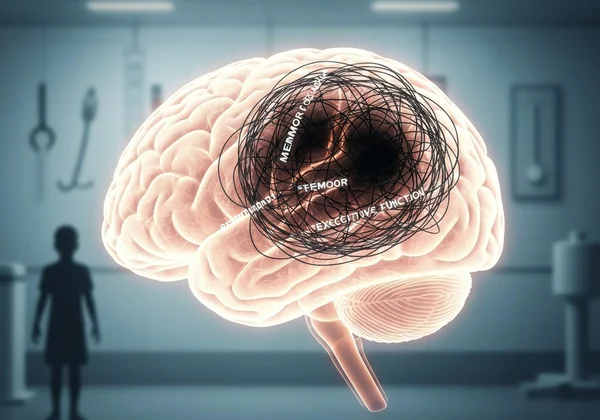Teen Trauma Test: Is It Angst, PTSD, or Trauma in Your Adolescent?
October 30, 2025 | By Nora Hayes
Navigating the teenage years can feel like trying to read a map in a storm. For parents and caregivers, the turbulence of adolescence brings a whirlwind of mood swings, rebellious streaks, and a deep yearning for independence. But amidst this expected chaos, a nagging question can arise: is this just typical teen angst, or could it be a sign of something deeper, like psychological trauma? Understanding the difference is crucial for providing the right support. This guide offers clarity on that crucial question. So, how do I know if I have trauma affecting my teen? We will explore the subtle yet significant signs that your teen’s struggles may stem from traumatic experiences and show how a preliminary screening can gain initial insights.

Understanding Teen Trauma Symptoms vs. Normal Adolescent Behavior
Differentiating between a teenager's normal developmental phase and a trauma response is one of the most significant challenges for any guardian. While angst is often characterized by temporary, situational moodiness and a push for identity, trauma symptoms are more pervasive, persistent, and disruptive. They are not just about "having a bad day" but reflect a fundamental shift in how a teen perceives themselves and the world around them. Trauma can recalibrate a young person's sense of safety, leading to changes that ripple through every aspect of their life. Recognizing these patterns is the first step toward understanding and helping them.
Emotional Shifts: When Mood Swings Signal More Than Hormones
It's easy to attribute every emotional outburst to hormones, but the emotional landscape of a traumatized teen is distinctly different. While typical teenage moodiness is often fleeting, trauma-related emotional shifts are more intense and enduring. You might notice your teen experiencing overwhelming sadness that doesn't lift, or sudden, explosive anger that seems disproportionate to the situation.
Another key indicator is emotional numbness or a state of being "checked out." They may seem detached from their feelings or from events happening around them, a coping mechanism known as dissociation. These aren't just swings on a pendulum; they are signs of a nervous system struggling to regulate itself after being overwhelmed. Pay attention to persistent anxiety, panic attacks, or a pervasive sense of dread that colors their daily experience, as these are significant red flags beyond typical teen emotions.
Behavioral Changes: Beyond Typical Rebellion and Experimentation
Teenage rebellion is about testing boundaries and forming an independent identity. Trauma-related behavioral changes, however, are often about managing unbearable internal pain. This can manifest as extreme social withdrawal, where a once-outgoing teen isolates themselves from friends and family. Conversely, it might appear as sudden engagement in risky behavior, such as substance abuse, reckless driving, or unsafe sexual practices, as a way to either feel something or numb the pain.
You might also observe a return to younger behaviors, like needing a nightlight or becoming unusually clingy. Other signs include unexplainable aggression, a loss of interest in passions they once loved, or a new pattern of lying or secrecy. These behaviors aren't just about breaking rules; they are desperate attempts to cope with an inner world that feels unsafe and out of control.

Cognitive & Academic Decline: Impact on Focus and Learning
Trauma has a profound impact on the developing brain, particularly the areas responsible for focus, memory, and executive function. If your teen's grades have suddenly plummeted or they've lost all interest in school, it warrants a closer look. This isn't necessarily laziness or defiance; it could be a cognitive symptom of trauma.
Trouble concentrating in class, difficulty remembering information, and an inability to organize their thoughts for assignments are common signs. A traumatized brain is often in a state of high alert (hypervigilance), constantly scanning for danger. This leaves very little mental energy for complex cognitive tasks like learning algebra or writing an essay. A significant drop in academic performance can be one of the most visible indicators that something serious is affecting your teen's well-being.
The Enduring Impact of Adverse Childhood Experiences (ACEs) on Teens
Understanding trauma in adolescents often means looking back at their earlier years. Adverse Childhood Experiences (ACEs) are potentially traumatic events that can have negative, lasting effects on health and well-being. These can include experiencing abuse or neglect, witnessing violence, or growing up in a household with substance abuse or mental health problems. The turbulent hormonal and social pressures of adolescence can often reawaken or intensify the impact of these past events. An unresolved ACE can act like a fault line beneath the surface, and the developmental earthquakes of the teen years can cause it to rupture. It's a critical reminder that what your teen is experiencing now may be rooted in events from long ago.

Recognizing Unresolved Trauma's Footprint in Adolescent Life
So, what does unresolved trauma look like in a teenager? The unresolved trauma signs are often a complex mix of the emotional, behavioral, and cognitive symptoms mentioned earlier. A teen might develop an intense fear of being abandoned, leading to clingy or controlling behavior in relationships. They may have a very negative self-view, expressing feelings of worthlessness or shame. Physical symptoms are also common, including chronic headaches, stomachaches, or fatigue that have no clear medical cause. This is because trauma is held not just in the mind, but in the body. If you feel these descriptions resonate, it may be time to take a trauma quiz to gather more structured information.
Navigating Conversations and Finding Help for Your Troubled Teen
Once you suspect trauma may be a factor, the next steps are crucial. Approaching your teen requires immense compassion, patience, and a willingness to listen without judgment. The goal is not to force a confession but to create a safe harbor where they feel seen and heard. Providing this support, alongside seeking the right kind of troubled teen help, can set them on a path toward resilience and recovery. It’s about building bridges, not walls, and guiding them toward the light of healing.
Creating a Safe Space for Open Dialogue and Validation
Effective communication strategies are paramount. Choose a calm, private moment to talk, free from distractions. Start by expressing your love and concern in a non-accusatory way. You could say something like, "I've noticed you seem to be having a really tough time lately, and I'm worried about you. I'm here to listen if you want to talk."
The most important thing you can do is validate their feelings, even if you don't fully understand them. Avoid phrases like "you're overreacting" or "just get over it." Instead, try "That sounds incredibly difficult" or "I'm so sorry you're going through that." Your role is to be a stable, loving presence, assuring them they are not alone and that their feelings are legitimate.

When to Seek Professional Guidance for Adolescent Trauma
While your support is vital, it is not a substitute for professional help. Acknowledging when you need to seek professional guidance is a sign of strength. If your teen is engaging in self-harm, expressing suicidal thoughts, using drugs or alcohol heavily, or if their symptoms are severely impacting their ability to function, it is essential to contact a mental health professional immediately. A therapist trained in trauma-informed care can provide the specialized tools and support your teen needs to process their experiences safely. An online screening tool can be an excellent first step to organize your thoughts and concerns before speaking with a professional. You can explore our resources to begin this journey.
Empowering Your Teen's Path to Healing and Resilience
Watching your teenager struggle is one of the hardest things a parent or guardian can endure. Distinguishing between the normal growing pains of angst and the deeper wounds of trauma is a vital act of care. By paying attention to the persistent shifts in their emotional, behavioral, and cognitive worlds, you can gain a clearer picture of their needs. Remember, recognizing the signs is not about placing blame but about opening the door to understanding and support.
Healing is a journey, not a destination, and it begins with a single, courageous step. If you are seeking a confidential and accessible starting point, consider using the free trauma test on our website. This scientifically-designed preliminary screening can help provide the initial clarity you need to empower your teen on their path to resilience and well-being.
Frequently Asked Questions About Teen Trauma and Support
How do I know if my child has trauma?
There is no single definitive sign, but look for persistent and significant changes from their baseline behavior. Key indicators include intense emotional swings, social withdrawal, a sudden drop in school performance, risky behaviors, and unexplained physical complaints. If these changes last for several weeks or months and impact their daily functioning, it's a strong signal that they may be struggling with more than just typical adolescent issues.
Can a parent self-diagnose trauma in their teenager?
No, parents cannot and should not diagnose trauma. A diagnosis must be made by a qualified mental health professional. However, parents play a critical role in observing behavior and identifying concerning signs. Using a screening tool can help organize your observations, but it is meant to be an informational first step, not a diagnostic conclusion. Always consult with a professional for an accurate assessment.
What is the most accurate trauma test for adolescents?
Clinical assessments administered by psychologists or therapists are the most accurate diagnostic tools. However, for a preliminary, confidential screening, a well-designed online tool can be very valuable. Our scientifically-designed platform offers a confidential online test for all ages, including adolescents, that is developed with input from mental health professionals to help identify potential trauma symptoms and guide you toward seeking appropriate professional support.
What does unresolved trauma look like in a teenager?
Unresolved trauma in a teenager often manifests as ongoing difficulties with emotional regulation, relationships, and self-esteem. They might be hyper-vigilant, easily startled, or have trouble trusting others. It can also look like chronic anxiety, depression, a deep sense of shame, or difficulty imagining a positive future. These are enduring patterns that go beyond typical teenage moodiness and signal a need for compassionate intervention.